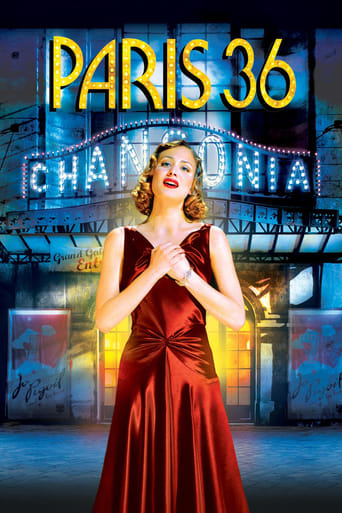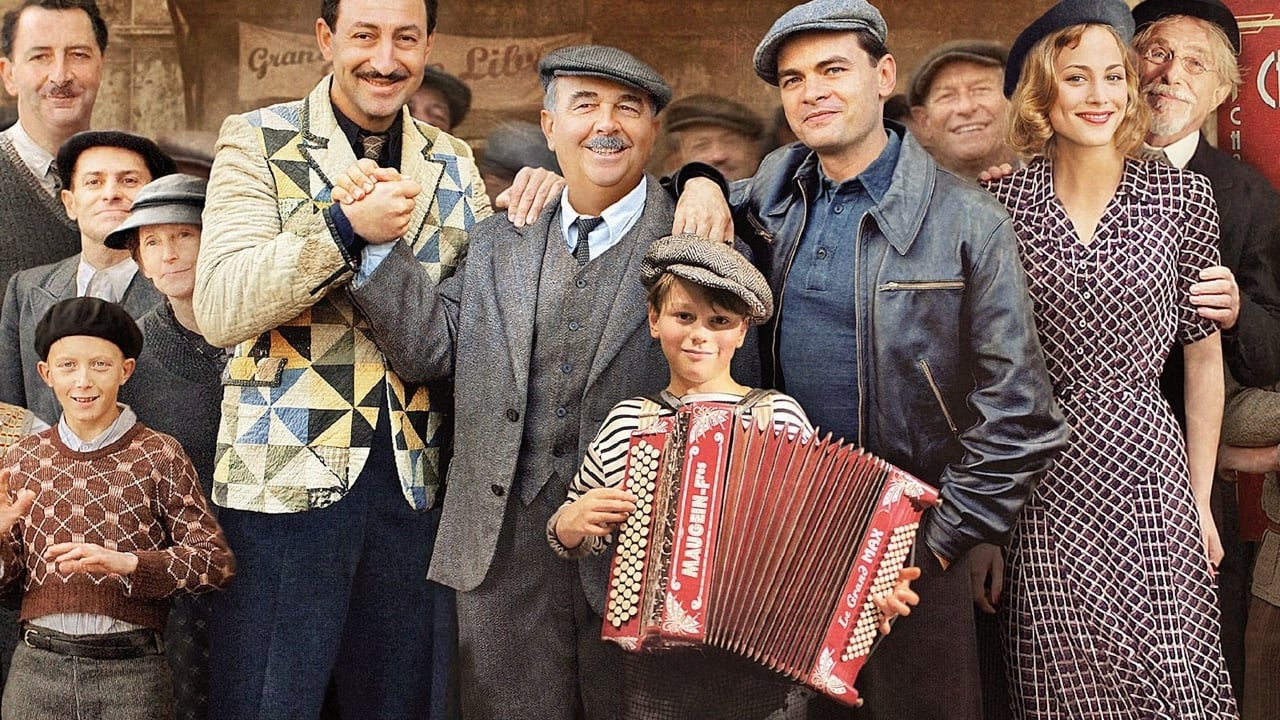jotix100
"Paris 36" as this film is known in America, takes a look back to an era before the madness that fell upon Europe with the arrival of WWII and its after effects. The setting for the story is an old music hall where vaudeville-like acts are performed, mostly for the people of that Parisian quarter where the theater was located. A nostalgic look at that time is what is at the heart of this French film.Written and directed by Christophe Barratier, the man that gave us "The Chorus", it is a film that evidently resonated with a lot of viewers that enjoyed the story of the old place. There are several themes running in the narrative like the clash of the emerging Social Democrats the party that admired its German neighbor and the leftist ideas from Leo Blum, an advocate for more radical views. Anti-Semitism, the loss of a son after a separation, a love story, are all interspersed in the film, with a bunch of songs with an old-fashioned style are all thrown in.Gerard Jugnot, an actor closely associated to the director, plays Pigoil, the man whose whole life seems to have been lived at the Chansonia. Clovis Cornillac seen as Milou, is the leftist agitator with a connection to the old music hall and the love of a new singer that became a star at the Chansonia, Douce. Kad Merad is an imitator who loves to do Fernandel, without much of the wit of the real actor. Nora Arnezeder is lovely to look at with her Douce.Tom Stern, a man that has worked a lot with Clint Eastwood, is on hand to give the old-fashioned look at the set that was built in Prague to resembled that run down part of Paris that probably could not be found in the present day Paris.
jdesando
I may have seen one of the last musical hall revivals in London a few years ago on The Strand—it was full of tinny song and dance that made you tap your feet and long for the good old days of vaudeville and innocence. The telly has pretty much killed that simple pleasure, but Paris 36, a melodramatic story of the revival of a Chansonia in northern Paris, 1936, revives the joy of ensemble acting and dancing, original music, and the intrigue so much a part of the lively arts when they become business and pleasure.Three Parisians undertake saving a music hall in their section of Paris called Faubourg using the talents of a star-crossed couple supplying the on and off stage romance. The intrigue is much less than Cabaret's; the nostalgia is more than Cinema Paradiso's; it's all more Moulin Rouge than Amelie. The songs are fetching, made especially for the film, and the plot is pure cliché right down to the lecherous businessman and cute ingénue.The background is unmistakably fascist versus socialist, owners battling workers for a depression-era slim slice of the economic pie and soul. Paris 36 risks it all with formulaic intrigue and predictable denouement. Yet throughout is a good cheer, a bel canto breeziness that draws you in to song, dance, history, and politics, never too heavy, light enough to make you wish that music hall still stood on The Strand.
moore2772
I loved it! Boz Luhrmann meets Cinema Paradiso in numerous ways. The plot is simple, as others here have already described. But it retains an abundance of charm. The undercurrents of antisemitism and fascism that were persistent in 1936 France are themes rarely seen on screen. Ditto for the Communist workers' movement during the same time. The clashes between these two groups were inevitable, and this film depicts that struggle brilliantly, without preaching to us or hitting us over the head with it. All the acting, singing and dancing are extremely well-done, and the cinematography, while Luhrmann-esquire is engaging. Best of all perhaps is the music. This film is destined to be a classic, and will always be on my favorites list. The only thing I would change is that I would retain the original title. The audience for this film is sophisticated enough to handle it.
Chris Knipp
Christophe Barratier found box office success in France in 2004 with his cute feel-good story The Chorus/Les choristes, which was about how a new music teacher brought humanity to a rural French reform school just after WWII by starting a boys' chorus. This also made newcomer Jean-Baptiste Maunier into a French teen icon. Faaubourg 36 is a glitzier, more musical (as in song-and-dance), more nostalgic period drama meant to evoke French films of the Thirties through its focus on a little working class Paris music hall called Chansonia. As the film opens, financial problems lead a mean magnate called Galapiat (Bernard-Pierre Donnadieu) to shut Chansonia down. But it's 1936, and in the spirit of socialist fervor (and universal labor-management strife) signaled by the rise of Leon Blum's Popular Front, the employees decide to take over Chansonia and run it themselves, on no money. This effort is spearheaded by the stage manager Germain Pigoil (Gerard Jugnot). Pigoil's life has filled with heartbreak. His dancer wife Viviane (Elisabeth Vitali) has left him and the state has chosen to take away his beloved accordionist son Jojo (Maxence Perrin) and send him to live with Viviane.Trying to create triumph out of adversity, Pigoil designates an awkward song-and-dance guy called Jacky Jacquet (Kad Merad) and a militant (and Jewish) leftist called Emile "Milou" Leibovich (Clovis Cornillac) to reopen the shuttered musical theater in uneasy cooperation with Galapiat. The show must go on! This seems a feeble prospect without financial backing, till the three men get lucky when a young newcomer nicknamed Douce (Nora Arnezedzer) turns up at tryouts. She's talented, pretty, and clearly a crowd-pleaser capable of selling tickets and keeping the place going. Her presence provides further insurance when the local boss turns out to like her.The ups and downs of the plot include depiction of the pervasive anti-Semitism of the extreme Right and the exacerbated hostilities between labor and ownership. There are little tragedies, but everything is softened and ends happily. Seekers of cinematic edge should look elsewhere. I found it hard to engage with the story, because it's too derivative, stereotypical, and diffuse. Production values are excellent and the music hall performances, if sometimes borderline cringe-worthy, carry through the period flavor. And there are some catchy tunes and sprightly stage turns as well.I saw this film when it was screened last summer at Saul Zaentz Studios in Berkeley by Tom Luddy, Co-Director of the Telluride Film Festival and the consensus of those then present seemed to be that 'Paris 36' (which has been picked up by Sony Pictures Classics) wasn't interesting or unusual enough to show at Telluride.But 'Paris 36' seems likely to do well with the more general US subtitles-film audience, and makes perfect sense as the "gala opening film" for the FSLC-UniFrance co-sponsored Rendez-Vous with French Cinema--though in my opinion last year's first night presentation, Claude Lelouch's 'Roman de Gare,' made a much more interesting opener.



 AD
AD



